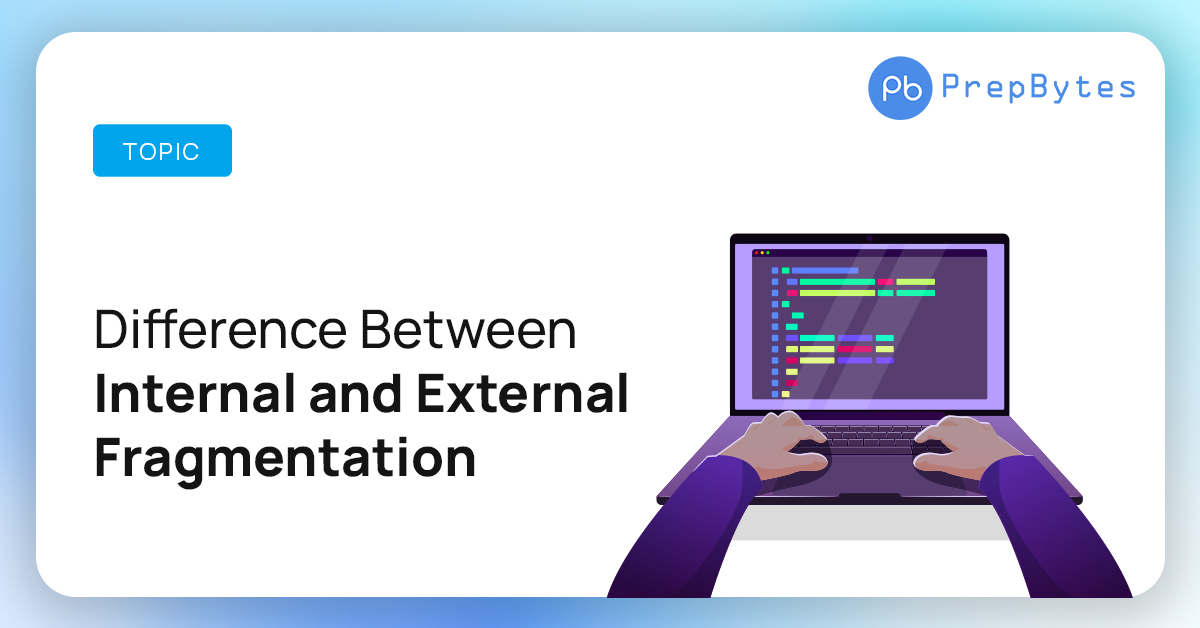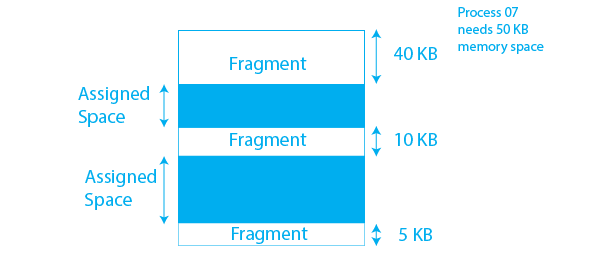Last Updated on December 11, 2023 by Ankit Kochar

Fragmentation is a critical concept in computer science, particularly in the realm of memory management. It refers to the division of memory space into smaller, non-contiguous blocks that can negatively impact system performance. Within this context, two primary types of fragmentation exist: Internal and External Fragmentation.
Understanding the disparities between internal and external fragmentation is crucial for developers, system architects, and anyone involved in optimizing memory usage within computer systems. This article aims to elucidate the key differences between these two types of fragmentation, their implications on system efficiency, and strategies to mitigate their adverse effects.
What is Fragmentation?
When the system’s memory is insufficiently employed for the purpose of storing information, it results in fragmentation, which lowers the system’s overall efficiency, capability, or both (sometimes). The effects of the fragmentation process fully depend on the operation’s individual storage space allocation plans and the precise types of fragmentation.
Fragmentation can occasionally result in some wasted storage space. The produced unused space in this case is also subject to this idea.
No matter how much fragmentation there is, the RAM utilized to store the data set (like file formats) is quite similar to that of other systems (like the FAT file system) (it happens from null to the extreme).
Types of Fragmentation:
In an Operating system, internal and external fragmentation are two different types of fragmentation.
- The internal fragmentation
- The external fragmentation
1. Internal Fragmentation in OS:
Internal fragmentation in OS occurs when memory is divided into blocks of varying size. The mounted-sized block is assigned to a method each time a memory request for a method is made. Internal fragmentation refers to the situation where the method is given a memory allotment that is somewhat bigger than the memory requested. The memory block sizes were the problem, which we corrected. This problem can be resolved if we allocate space to the process via dynamic partitioning.
A process-specific memory block is larger in internal fragmentation. As it cannot be used by another process, some memory is left unused. Moreover, internal fragmentation is a problem that arises when memory is partitioned into fixed-sized units. By choosing the smallest partition that is yet big enough.

2. External Fragmentation in OS:
The empty space between non-contiguous memory chunks is known as external fragmentation. These unoccupied areas are too few to support a new procedure. Although the entire memory space is sufficient to accommodate a request or a process, it cannot be used since it is not contiguous.
When memory is partitioned into units of varying sizes, external fragmentation results. The sizes of the processes have an impact on these partitions’ size.
Compaction and memory content shuffles to group all the free memory into one big block can both reduce external fragmentation. Relocation must be dynamic to allow for compaction.

Difference between Internal and External Fragmentation:
Below is the difference between internal fragmentation in OS and external fragmentation in OS as a tabular form
| Internal Fragmentation | External Fragmentation |
|---|---|
| 1. The problem is known as internal fragmentation when there is a discrepancy between the required memory space and the allocated memory space. | 1. The issue is known as external fragmentation when there are small, non-contiguous memory chunks that cannot be assigned to any process. |
| 2. Internal fragmentation happens when memory chunks are allotted that have a predetermined size. | 2. External Fragmentation happens when memory blocks are allotted but are of different sizes. |
| 3. Internal fragmentation happens when a process uses less space or requires more space than the size of the memory block given to it. | 3. When a process is deleted from the main memory, external fragmentation happens. |
| 4. The remedy for internal fragmentation is Best Fit Block Search. | 4. The answer to external fragmentation is compaction. |
| 5. When paging is used, internal fragmentation happens. | 5. When segmentation is used, external fragmentation takes place. |
Advantages of Fragmentation:
Some of the advantages of Fragmentation in OS are:
- Fragmentation can help maximize the use of available storage space by allocating small blocks of free space to store data.
- Fragmentation allows for files of different sizes to be stored on the disk.
- This flexibility can be especially useful in situations where file sizes vary widely.
- Fragmentation can result in faster access times for small files because they can be stored in smaller clusters.
Disadvantages of Fragmentation:
The main disadvantages of fragmentation include:
- Fragmentation can lead to slower access times for large files because they are stored in non-contiguous clusters, requiring more time to access them.
- Fragmentation can lead to increased wear and tear on the disk drive because the read/write head has to move around more to access the data.
- Fragmentation can increase the risk of data loss because it can make it more difficult to recover data from a damaged or corrupted disk.
- Fragmentation can increase system overhead by requiring more time and resources to manage the scattered data on the disk.
Conclusion:
In conclusion, the distinction between internal and external fragmentation is vital for comprehending memory allocation challenges in computing systems. Internal fragmentation occurs when memory is allocated in larger chunks than necessary, leading to wasted space within allocated blocks. On the other hand, external fragmentation arises when free memory exists but is dispersed in smaller, non-contiguous blocks, making it unusable for larger contiguous allocations.
Addressing these issues requires a nuanced understanding of memory allocation algorithms and effective memory management strategies. By employing techniques such as compaction, memory pooling, and dynamic memory allocation algorithms, developers can mitigate the impact of fragmentation and optimize system performance.
Efforts to minimize fragmentation not only enhance system efficiency but also contribute to better resource utilization and overall system stability. As technology advances and computing systems become more complex, an understanding of fragmentation and its mitigation strategies remains crucial for ensuring optimal system performance.
Frequently Asked Questions(FAQ) on the Difference Between Internal and External Fragmentation:
Here are some FAQs related to the difference between internal and external Fragmentation.
1. What is internal fragmentation?
Internal fragmentation occurs when allocated memory blocks are larger than necessary, resulting in wasted space within these blocks due to leftover, unused memory.
2. What causes external fragmentation?
External fragmentation arises when free memory exists in smaller, non-contiguous blocks, making it challenging to allocate larger, contiguous blocks of memory even when sufficient free memory is available.
3. How does fragmentation impact system performance?
Fragmentation can lead to inefficient memory usage, increased allocation and deallocation overhead, and a decrease in overall system performance due to the difficulty in efficiently utilizing available memory.
4. How can one mitigate the effects of fragmentation?
Several strategies can be employed to address fragmentation, including memory compaction, dynamic memory allocation techniques, memory pooling, and algorithms such as best fit or first fit to optimize memory usage.
5. Why is understanding fragmentation important in computer systems?
Understanding fragmentation is crucial as it directly impacts system efficiency, resource utilization, and overall performance. Effective management of fragmentation ensures optimal usage of available memory and contributes to a more stable and responsive computing environment.


